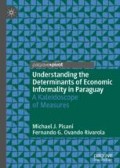Abstract
This chapter discusses the results of ten logistic regressions that mirror the ten dependent variables used as proxies to estimate informality in Paraguay in 2017. The ten measures are organized into three groups, (1) social benefits, containing firms that offer employees medical care, social security, and paid vacations; (2) organizational practices, encompassing registered firms, firms that provide client receipts, unionized firms, and employee contracts; and (3) firm characteristics, comprised of the self-employed and limited number of employees. Summarized tables are provided for each group. Confirmatory estimates from the 2018 encuesta permanente de hogares are discussed. We also offer a fuller and more nuanced discussion of self-employment and informality. The chapter concludes with a focused discussion on the primary predictors of in/formality.
Access this chapter
Tax calculation will be finalised at checkout
Purchases are for personal use only
Notes
- 1.
As of March 2018, women hold important roles as CEOs and government leaders. For example, Viviana Varas is President of Itaú, the largest bank by size of deposits in Paraguay, Liz Ramírez leads Perfecta Automotores, the BMW representative in Paraguay, Liz Cramer is the Minister of Industry and Commerce, and 16.8% of seats in the Seantte and the House of Deputies are occupied by women. Women should continue to contribute in increased numbers as the current education profile indicates that women in both the public and privates sectors have more years of schooling than men, 1.1 and 2.2 years more, respectively, for the public and private sectors (5días 2019).
- 2.
This serves as a much better proxy than enrollment in social security (nearly zero for all three groups) and firm size which is conditioned by self-employment as to 10 or fewer employees.
- 3.
Beyond the scope of this book, we are working on the segmentation of self-employment along the lines outlined in Table 5.4.
- 4.
ANOVA, F = 63449.849, df = 1, P = 0.000.
- 5.
Vázquez (2010) suggests this region consists generally of the central Chaco, Presidente Hayes, and Alto Paraguay, describing and naming the area as a new economic subregion.
References
5días. (2019, March 8). Mujeres se Preparan Más que los Hombres. 5días, p. 20.
DGEEC. (2017, October). Encuesta sobre Uso del Tiempo, EUT 2016: Principales Resultados. Available at: https://www.dgeec.gov.py/Publicaciones/Biblioteca/eut2016/EUT2016.pdf. Accessed 24 Apr 2019.
Garlati-Bertoldi, P.-A. (2018). Informal employment dynamics in Paraguay, 18(13), Working paper, Facultad de Ciencias Económicas y Administrativas Departamento de Economía, Pontificia Universidad Javeriana (Colombia). Available at: https://drive.google.com/file/d/173vBHY_qlf-fm2MnubzxFeTo9bxHdNlE/view. Accessed 19 Feb 2019.
Ovando, F. G. (2017). Análisis longitudinal de las transiciones de status laboral en la población juvenil urbana de Paraguay: Periodo 1° trimestre 2010–4° trimestre 2016, Observatorio Laboral, Ministerio de Trabajo, Empleo y Seguridad Social and The Inter-American Development Bank. Available at: http://www.cadep.org.py/2017/10/empleo-juvenil-2010/. Accessed 22 Feb 2019.
Servín, B., & Masi, F. (2018). Territorios y Empresas: Aproximación al Desarollo de las Regiones en Paraguay. Asunción: Centro de Análisis y Difusión de la Economía Paraguaya, CADEP.
Vázquez, F. (2010). Las Nuevas Regiones. In I. Telesca (Ed.), Historia del Paraguay (pp. 33–47). Asunción: Taurus Historia.
Author information
Authors and Affiliations
Corresponding author
Rights and permissions
Copyright information
© 2019 The Author(s)
About this chapter
Cite this chapter
Pisani, M.J., Ovando Rivarola, F.G. (2019). Discussion of Results. In: Understanding the Determinants of Economic Informality in Paraguay. Palgrave Pivot, Cham. https://doi.org/10.1007/978-3-030-24393-7_5
Download citation
DOI: https://doi.org/10.1007/978-3-030-24393-7_5
Published:
Publisher Name: Palgrave Pivot, Cham
Print ISBN: 978-3-030-24392-0
Online ISBN: 978-3-030-24393-7
eBook Packages: Economics and FinanceEconomics and Finance (R0)

